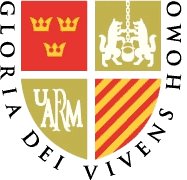Antonio Ruiz de Montoya University
 | |
| Motto |
The glory of God is the fully alive human person. Gloria Dei Vivens Homo |
|---|---|
| Established | 2003 |
Religious affiliation | Jesuit, Catholic |
Academic affiliation | AUSJAL |
| Rector | Dr. Ernesto Cavassa, SJ |
| Location | Av. Paso de los Andes 970, Pueblo Libre, Lima, Peru |
| Predecesor | School of Pedagogy, Philosophy, and Literature Antonio Ruiz de Montoya |
| Website | UARM |
Antonio Ruiz de Montoya University (Universidad Antonio Ruiz de Montoya – UARM) is a private, non-profit university located in the city of Lima, Peru, in the district of Pueblo Libre. It was founded by the Society of Jesus on 4 July 2003.[1] It incorporated the School of Pedagogy, Philosophy, and Literature Antonio Ruiz de Montoya which had been founded in 1991. It was the first Jesuit university in Peru and is named after the renowned Peruvian Jesuit Antonio Ruiz de Montoya.[2]
The university has 10 academic and professional programs. Among the most prominent and specialized are the Faculty of Social Sciences with courses in politics or economics and the Faculty of Humanities and Philosophy. In addition UARM offers 12 graduate programs for the masters and doctorate.
UARM has a six-tiered tuition system for the various socioeconomic strata.[3]
Despite having been founded in the 21st century, compared to other private universities in operation for more than 20 or 30 years, from 2011 UARM has ranked among the top 20 universities in Peru according to the prestigious pollster America Economy, and was ranked 12th in 2015.[4]
Academics
Antonio Ruiz de Montoya University offers the following programs of undergraduate and graduate study:
Faculty of Humanities
- Secondary Education majoring in philosophy and historical social sciences
- Primary school majoring in language and literature[5]
- Philosophy
- Psychology
- Journalism
Faculty of Social Sciences
- Sustainable tourism[6][7]
- Political science
- Law
- Economy majoring in public and environmental management.[8]
School of Engineering and Management
- Administration
- Industrial engineering[9]
Institutes
The Institute for Ethics and Development (IED) was founded in 1994 by the Higher School of Pedagogy, Philosophy, and Literature, Antonio Ruiz de Montoya. With the founding of the university in 2003, IED took on this role of facilitating reflection, training, research, and advocacy – of promoting the ethical aspects of development in Peruvian society. IED works mainly with local and regional institutions, travelling through regions such as Áncash, Apurímac, Arequipa, Ayacucho, Cusco, Huánuco, Junín, Lambayeque, Moquegua, Puno, and Piura. IED has trained social leaders and professionals, and the staff of NGOs and of Jesuit social centers. It has collaborated in advocacy campaigns and in generating public policy proposals.[10] In 2017 it had a full-time staff of four.[11]
IED produced a much-publicized report Mapping Anticorruption Initiatives in the Peruvian State, Civil Society, and Companies. It found 32,000 corruption cases reported nationwide, which produced only 3,200 convictions and 506 jail sentences.[12] Also, Eduardo Vega, a former Ombudsman and in 2016 director of IED, found 968 public works halted from lack of funds or from poor design or execution. The Comptroller General described half of the halted works as unjustified.[13]
Other university institutes
- Institute for Faith and Culture
- Institute for Research and Education Policy[14]
See also
- Education in Peru
- List of universities in Peru
- Publications[15]
References
- ↑ XII anniversary. Accessed 14 October 2016.
- ↑ "Historia". www.uarm.edu.pe (in Spanish). Retrieved 2017-10-31.
- ↑ "Información Económica". www.uarm.edu.pe (in Spanish). Retrieved 2017-10-01.
- ↑ "Universidad Antonio Ruiz de Montoya | Ranking & Review". www.4icu.org. Retrieved 2017-10-01.
- ↑ LR, Redacción (2015-06-08). "Programa de Titulación en Educación de la Ruiz de Montoya | LaRepublica.pe" (in Spanish). Retrieved 2017-10-01.
- ↑ "Turismo IN - PROMPERÚ". www.promperu.gob.pe (in Spanish). Retrieved 2017-10-01.
- ↑ Cenfotur. Accessed 14 October 2016.
- ↑ Georgetown student immersion experience, on Challenges and Opportunities in Peru today. Accessed 14 October 2016
- ↑ UTEC cooperation agreement for humanistic education of engineers. Accessed 14 October 2016.
- ↑ "Instituto de Ética y Desarrollo". www.uarm.edu.pe (in Spanish). Retrieved 2017-10-31.
- ↑ "Miembros". www.uarm.edu.pe (in Spanish). Retrieved 2017-10-31.
- ↑ Portal, Administrador. "Perú: Dos de cada 100 denunciados por corrupción van a prisión". www.aciem.org (in Spanish). Retrieved 2017-10-31.
- ↑ elEconomista.es. "La mayoría de acusados por corrupción no terminan en prisión - eleconomistaamerica.com" (in Spanish). Retrieved 2017-10-31.
- ↑ "Investigación e Incidencia". www.uarm.edu.pe (in Spanish). Retrieved 2017-10-31.
- ↑ "Universidad Antonio Ruiz de Montoya - LIBROS PERUANOS - Editorial". www.librosperuanos.com (in Spanish). Retrieved 2017-10-01.